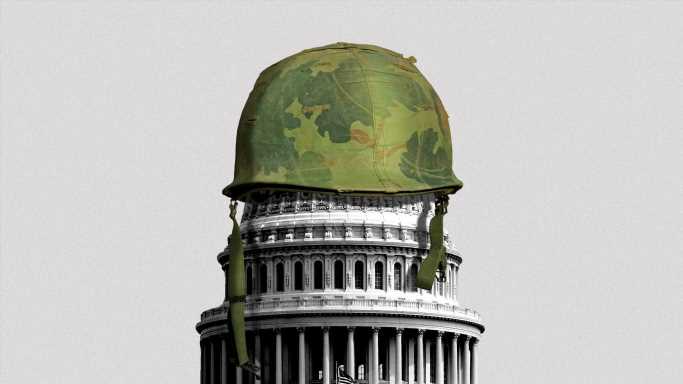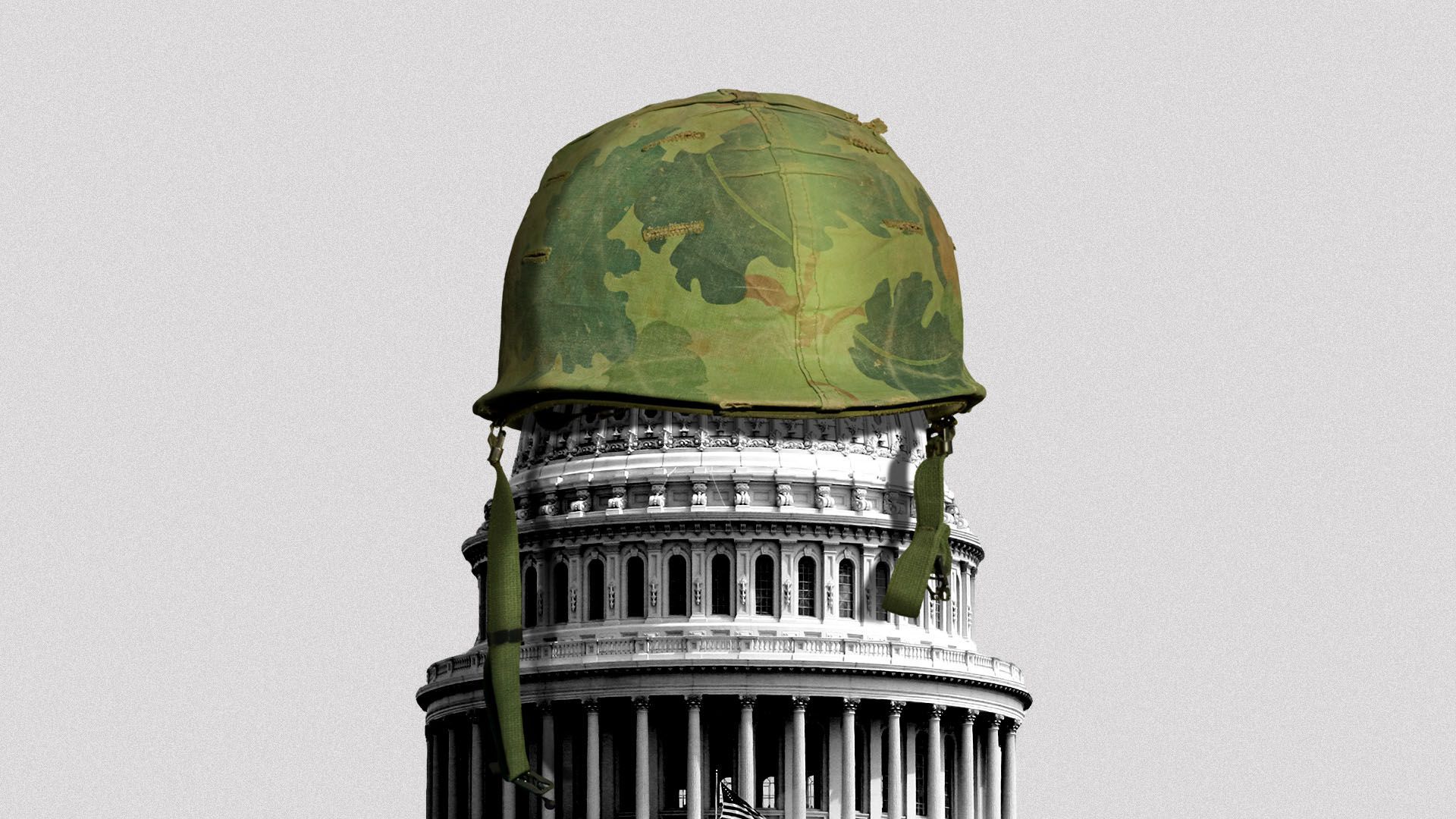Illustration: Sarah Grillo/Axios
Congress is about to repeal a president's authorization to use military force for the first time in about half a century, kicking off a debate about restoring its role in authorizing future wars.
Why it matters: Democrats are eager to declare they've succeeded in facilitating an official end to America's "endless wars." The 2002 AUMF that justified the Iraq war was cited as recently as the January 2020 assassination of Iranian Gen. Qassem Soleimani, who was killed in a drone strike in Baghdad.
- Critics say the authorization was never intended for such an operation and letting it linger could trigger misuse by future presidents.
- Some Republicans fear repealing it could embolden Iranian-backed militias in Iraq, which have carried out attacks against U.S. troops stationed there.
- Biden, who supports repealing it, has acknowledged the U.S. has "no ongoing military activities that rely solely on the 2002 AUMF as a domestic legal basis."
- The repeal of another resolution passed in 2001, which also has been exploited, would be a heavier lift.
Between the lines: The 2002 authorization gave President George W. Bush the domestic authority to invade Iraq and topple the government of Saddam Hussein.
- Nearly 20 years later, the number of U.S. troops in Iraq is down to 2,500 from a peak of about 170,000, and the Iraqi government is an ally of the United States.
- The Senate — on a rare bipartisan basis — is expected to vote as early as this week to repeal it as a component of approving the National Defense Authorization Act.
- Senate Minority Leader Mitch McConnell (R-Ky.) concedes it will be repealed but is expected to speak out against the move, aides told Axios.
Driving the news: Part of the Democratic impetus is to rebound from the heavy criticism Biden and their party took for the administration's botched withdrawal from Afghanistan.
- A repeal of the 2002 AUMF also would lay the groundwork for another effort to replace the 2001 AUMF for the post-9/11 "war on terror."
- Critics label it a blank check cited for operations in Iraq, Yemen, Somalia, Libya, Syria, Niger, Djibouti, Ethiopia, Eritrea, Kenya and the Philippines.
- It's also been used to justify the indefinite detention of prisoners at Guantánamo Bay.
Lawmakers who support repealing and replacing the 2001 authorization insist they're a long way off from that vote. Instead, they see their plans to deal with the 2002 AUMF as a necessary first step.
- Sen. Tim Kaine (D-Va.), who's been leading the effort, said he and other members of the Senate Foreign Relations Committee are in discussions with the White House about repealing and replacing the 2001 AUMF.
- "But the idea was always we would get another [AUMF] repealed first,” he said.
What they're saying:
- Sen. Bob Menendez (D-N.J.), chairman of the foreign relations panel, told Axios: "I think that when Congress authorizes the use of force, when the purpose of its use has ended, then it should repeal it so no one can misuse it.”
- Sen. Ted Cruz (R-Texas) was evasive, saying, “I am a strong believer in Congress exercising its authority of war fighting."
- "At the same time, some of the Democratic efforts in this area are really about giving a green light to Iran and the ayatollah, and trying to tie the hands of any military response to a nuclear Iran," Cruz said. "I think that’s a mistake."
Menendez cautioned that acting on the 2001 AUMF "is much more difficult." He said, "2001 is not just about repeal; it’s about replacement."
- Sen. Rand Paul (R-Ky.), a proud libertarian, told Axios: "I think it would be great" to repeal the 2002 AUMF. But he also warned the 2001 AUMF, which he supports repealing, is "a bigger hurdle.”
- Sen. Ben Cardin (D-Md.), told Axios he's far more interested in repealing the 2001 AUMF because it’s been interpreted by a president to “do just about anything he wants to."
- "And I don’t agree with that interpretation. But now four administrations have interpreted 2001 as broad powers," Cardin said.
Source: Read Full Article
-
Raimondo channels CEOs' case for holiday cheer
-
Brexit’s real politics have won again with Erdogan’s win in Turkey’s election
-
Lee Anderson rages at ‘vile’ slur on his family in LBC phone-in prank
-
Hunter Biden Says Prosecutors Reneged on Major Part of Plea Deal
-
SNP MP refuses to say if Yousaf will lead party into next election


